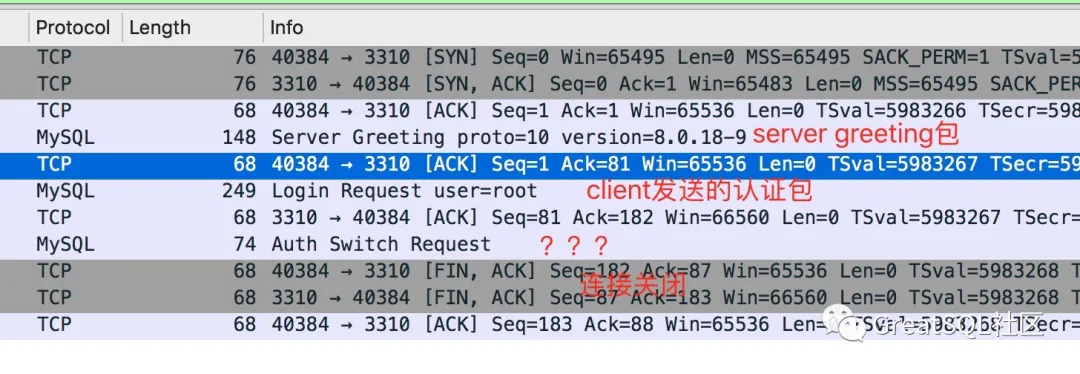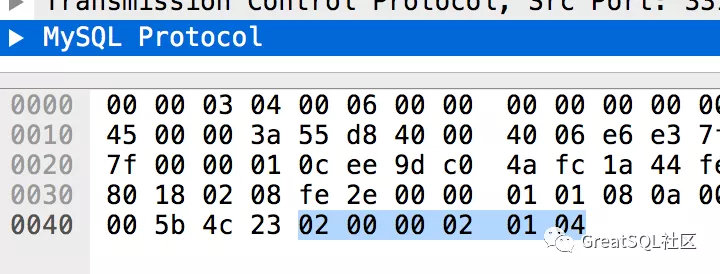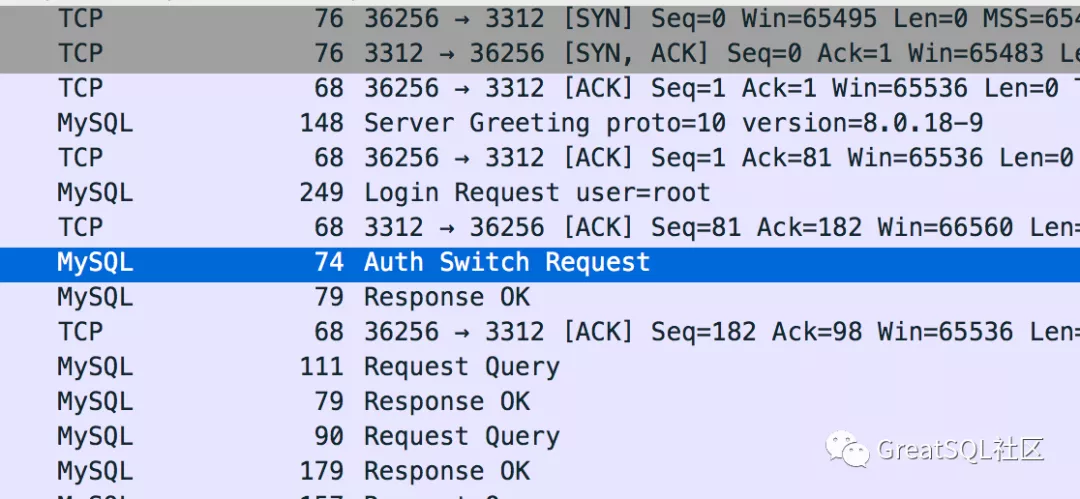MySql教程
技术分享|MySQL caching_sha2_password认证异常问题分析
0. 导读
相同的账号、密码,手动客户端连接可以成功,通过MySQL Connectors却失败了,为什么?
1. 现象描述
通过MySQL C API编写的一个程序,在进行用户登录操作的时候,程序报错,登录失败。
但是如果通过mysql客户端,手动登录成功后,再启动客户端程序,不再报错,程序运行成功。
2. 抓包分析问题
学会抓包,就超越了90%的程序员。 sudo tcpdump -i any tcp and port xxx -s 1500 -w filename -v
C程序登录失败时的包
前两个包很正常,第三个包第一次见,wireshark解析的叫做 AuthSwitchRequest.
看下这个包的内容。
mysql客户端登录成功后,再执行C程序登录成功时的包
看下这个AuthSwithRequest包的内容。
认证成功和失败的包数据是不同的,分别是03和04。
3. AuthSwitchRequest包
首先看下AuthSwitchRequest包的官方解释。
Protocol::AuthSwitchRequest: Authentication Method Switch Request Packet. If both server and client support CLIENT_PLUGIN_AUTH capability, server can send this packet to ask client to use another authentication method. Payload 1 [fe] string[NUL] plugin name string[EOF] auth plugin data
可以看出,这个包payload的第一个字节是0xfe,与抓包中的01是不同的,而且AuthSwitchRequest后面跟的应该是plugin name,是个字符串,而抓包中,内容是04。
所以wireshard解包错误了。
在协议里面我们找下payload第一个字节是01的包,找到了AuthMoreData的包。
Protocol::AuthMoreData: Payload 1 [01] string[EOF] plugin data
这个包的说明payload后面是string类型,和我们的抓包也是有些出入,先不管这个了。
跟到这里只能去代码里面找下这个包是什么。
4. 服务器认证
目前用户认证默认都走caching_sha2_password的plugin,之前版本都是mysql_native_password。
mysql > select user,host,plugin from mysql.user; +------------------+-----------+-----------------------+ | user | host | plugin | +------------------+-----------+-----------------------+ | mysql.infoschema | localhost | caching_sha2_password | | mysql.session | localhost | caching_sha2_password | | mysql.sys | localhost | caching_sha2_password | | root | localhost | caching_sha2_password | +------------------+-----------+-----------------------+ mysql > show variables like '%auth%'; +-------------------------------+-----------------------+ | Variable_name | Value | +-------------------------------+-----------------------+ | default_authentication_plugin | caching_sha2_password | +-------------------------------+-----------------------+ 1 row in set (0.01 sec)
服务器端认证代码在sql/auth/sha2password.cc文件中的caching_sha2_password_authenticate函数。
在此函数中,找到了发包的代码,正好可以对应到我们抓包的AuthMoreData。
996 if (pkt_len != sha2_password::CACHING_SHA2_DIGEST_LENGTH) return CR_ERROR;
997
998 std::pair<bool, bool> fast_auth_result =
999 g_caching_sha2_password->fast_authenticate(
1000 authorization_id, reinterpret_cast<unsigned char *>(scramble),
1001 SCRAMBLE_LENGTH, pkt,
1002 info->additional_auth_string_length ? true : false);
1003
1004 if (fast_auth_result.first) {
1005 /*
1006 We either failed to authenticate or did not find entry in the cache.
1007 In either case, move to full authentication and ask the password
1008 */
1009 if (vio->write_packet(vio, (uchar *)&perform_full_authentication, 1))
1010 return CR_AUTH_HANDSHAKE;
1011 } else {
1012 /* Send fast_auth_success packet followed by CR_OK */
1013 if (vio->write_packet(vio, (uchar *)&fast_auth_success, 1))
1014 return CR_AUTH_HANDSHAKE;
1015 if (fast_auth_result.second) {
1016 const char *username =
1017 *info->authenticated_as ? info->authenticated_as : "";
1018 LogPluginErr(INFORMATION_LEVEL,
1019 ER_CACHING_SHA2_PASSWORD_SECOND_PASSWORD_USED_INFORMATION,
1020 username, hostname ? hostname : "");
1021 }
1022
1023 return CR_OK;
1024 }
1025
首先进行了fast_authenticate,根据这个结果fast_auth_result.first,分别发送了不同的包perform_full_authentication和fast_auth_success。
791 static char request_public_key = '\2'; 792 static char fast_auth_success = '\3'; 793 static char perform_full_authentication = '\4';
可以看到我们C程序登录失败时,给我们发送的是perform_full_authentication,而认证成功发送的是fast_auth_success包。
什么情况下会出现perform_full_authentication包呢?代码中给出了说明,我们就不去看fast_authenticate的代码逻辑了,从说明就能了解到大概情况。
1006 We either failed to authenticate or did not find entry in the cache. 1007 In either case, move to full authentication and ask the password
也就是说,如果cache中没有记录,或者认证失败,会进入perform_full_authentication流程。我们从这个认证插件的名字caching_sha2_password就可以知道,这是个带cache的认证插件。
而这正好解释了为什么用mysql客户端手动登陆后,我们C程序就登录成功了,因为cache中已经有了记录。
那么:为什么手动客户端认证就能成功呢?而我们自己写的C程序就会失败呢?
且看客户端认证分析。
5. 客户端认证
客户端认证的代码逻辑在sql-common/client_authentication.cc中的caching_sha2_password_auth_client函数中。
514 if (pkt_len != 1 || *pkt != perform_full_authentication) {
515 DBUG_PRINT("info", ("Unexpected reply from server."));
516 return CR_ERROR;
517 }
518
519 /* If connection isn't secure attempt to get the RSA public key file */
520 if (!connection_is_secure) {
521 public_key = rsa_init(mysql);
......
523 if (public_key == NULL && mysql->options.extension &&
524 mysql->options.extension->get_server_public_key) {
525 // If no public key; request one from the server.
......
540 }
541
542 if (public_key) {
543 /*
......
584 } else {
585 set_mysql_extended_error(mysql, CR_AUTH_PLUGIN_ERR, unknown_sqlstate,
586 ER_CLIENT(CR_AUTH_PLUGIN_ERR),
587 "caching_sha2_password",
588 "Authentication requires secure connection.");
589 return CR_ERROR;
590 }
591 } else {
592 /* The vio is encrypted already; just send the plain text passwd */
593 if (vio->write_packet(vio, (uchar *)mysql->passwd, passwd_len))
594 return CR_ERROR;
595 }
可以看到客户端收到perform_full_authentication包后,根据connection_is_secure进行了分支。
我们的客户端中的连接肯定是没有开启SSL的,所以会走进if (!connection_is_secure)流程。
mysql客户端登录默认是开启SSL认证的,故走了else流程。
我们使用mysql客户端登录时的命令如下,是开启了ssl的:
shell> bin/mysql -h127.0.0.1 -uroot -P3301 -ppassword
如果客户端想禁用ssl,需要加上–ssl-mode=disable选项。
所以,这就解释了为什么客户端能登录成功了。
现在我们看下if (!connection_is_secure)流程,发现没有进入下面的if流程,这样就不会生成public_key,导致public_key为空。
if (public_key == NULL && mysql->options.extension && 524 mysql->options.extension->get_server_public_key)
具体来说,是因为我们的连接选项没有设置mysql->options.extension->get_server_public_key。
6. 解决方法
在不开启ssl选项的时候,我们需要设置get_server_public_key选项。
+ bool get_server_public_key = true; + mysql_options(m_client, MYSQL_OPT_GET_SERVER_PUBLIC_KEY, + &get_server_public_key);
-
部署MySQL集群项目实战:新手入门教程11-04
-
如何部署MySQL集群资料:新手入门指南11-04
-
MySQL集群项目实战:新手入门指南11-02
-
初学者指南:部署MySQL集群资料11-02
-
部署MySQL集群教程:新手入门指南11-01
-
如何部署MySQL集群:新手入门教程11-01
-
部署MySQL集群学习:新手入门教程11-01
-
部署MySQL集群入门:新手必读指南11-01
-
BinLog入门:新手必读的MySQL二进制日志指南10-23
-
Binlog入门:MySQL数据库的日志管理指南10-23
-
MySQL数据库入门教程:从安装到基本操作10-22
-
MySQL读写分离入门教程:轻松实现数据库性能提升10-22
-
MySQL分库分表入门教程10-22
-
MySQL慢查询的诊断与优化指南10-22
-
MySQL索引入门教程:快速理解与应用指南10-22





